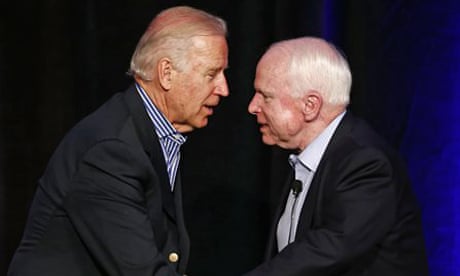US Vice-President Joe Biden says a lot of funny things. This weekend, the ever-hilarious veep said that John McCain "probably" would have defeated Barack Obama in the 2008 election – were it not for the global financial crisis following the Lehman Brothers bankruptcy on 15 September 2008. I disagree wholeheartedly with Biden's assertion: Barack Obama would have been in a strong position to win 2008 even without the financial collapse.
Let's start off with Obama's most basic advantage at the time: the GOP had held the White House for the eight years before he ran. From 1952 through to 2004, there have been six instances of a party holding the White House for more than a term. In the subsequent election – after eight years with the president on their side – that party won only one of those those six elections. Whether the incumbent party held the White House for more than four years explains about 30% of the difference in vote margins in elections for over half a century, heading right into 2008.
These odds were made worse by an economy that was already lousy months before the crash. When averaging across multiple segments of the economy, growth was negative by early July. The only other year growth was negative across this many sectors was in 1980, per Nate Silver's economic index. In that election, Jimmy Carter became the only president since the start of the 20th century to lose after taking the White House from the rival party – and he got blown out by 9pt.
This 2008 recession, combined with an increasingly disliked war in Iraq, caused President George W Bush's approvals to plunge to almost 30% by 1 September 2008 – the lowest early September approval for any sitting president before a major election, going back all the way since modern scientific polling began in the 1930s. The only president who comes close is Truman, who had approval ratings around 32% and 33% going into the 1946 midterms and 1952 presidential election. His party lost control of both chambers of Congress and then the presidency.
Indeed, the fundamentals strongly indicate that Obama should have beaten McCain even before the financial collapse. Don't believe me? Look at the models advanced by political scientists in August of 2008. Using a combination of economic measures, Bush's approval ratings, Obama-McCain poll data, and a host of other factors, six of nine models written up in the journal of the American Political Science Association had Obama beating McCain. The combination models had Obama winning 80% of the time, by an average of 4pt.
Focusing only on the polling from Obama v McCain leads us to the same conclusion. From the time Obama clinched the Democratic nomination, in early June, through the announcement of his running mate, in late August, Pollster.com recorded 103 national polls. McCain led in six of them. Three of the polls showed a tie. That means that 91% of the polls conducted during the summer had Obama beating McCain, by an average of a slightly less than 4pt, and with the median of Obama winning by 3pt.
McCain did take the lead after the Republican National Convention, by an advantage of a little less than 2pt. A smart convention plan, along with the unexpected emergence of Sarah Palin, provided a temporary boost. But looking at the data, the boost was clearly not going to last. The Pollster.com aggregate (being its most sensitive in order to catch any micro-trends) already had Obama regaining the lead by 14pt in September.
The research seems to concur with a naive reading of the polls. Looking at wave studies on respondents' choices before and after the collapse, two different studies both agree that Obama would have won without the collapse. Sunshine Hillygus and Michael Henderson (pdf) found that the collapse gave Obama a single point more. Richard Johnston, Emily Thorson, and Andrew Gooch (pdf) put the gain at 3pt. Neither gain was "decisive" in determining the winner the election (and my thanks to Nadia Hassan for sending me links to these studies).
Thus, I'm fairly confident that Obama would have won the 2008 election without the financial disaster of September 2008. Would he have won by less? Maybe, though not by much. The economy, already limping, and negative views about Iraq drove opinion on Bush down to record lows; McCain, as the candidate of Bush's party, was hardpressed to overcome these obstacles, which gave him a deficit in the polls long before the Lehman's collapse. McCain would almost certainly have lost to Obama even if the economy had not buckled towards the end of the election season.
